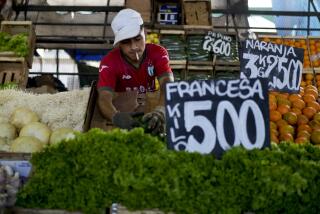Inflation Returning to Argentina : Resurgence Comes as Government Readies for Debt Talks
- Share via
BUENOS AIRES — Like a weed that will not die, inflation has returned to Argentina scarcely a year after unprecedented shock treatment to root it out.
The government’s anti-inflationary Austral Plan won wide international acclaim, but now the government is looking for new solutions on the eve of negotiations with foreign creditors to ease repayment of Argentina’s $50-billion debt.
“It is going to be very difficult to recover the romantic era of the Austral Plan,” Treasury Secretary Mario Brodersohn said.
He will travel to the United States this week to meet with creditor bankers. Another team of Argentine officials will meet with representatives of the International Monetary Fund in search of a new standby agreement for as much as $2 billion.
Although Argentina made peace with its creditors after announcing the Austral Plan last year, the new talks will come in the context of Argentine fury at U.S. subsidized grain sales to the Soviet Union. President Raul Alfonsin’s opponents, and some members of his government, say that future payments on the debt should be conditioned on export losses because of the U.S. sale.
Of more tangible concern to the man in the street here is the renewed inflation. The cost of living rose 6.8% in July, by the government’s reckoning. This is the highest monthly increase since Alfonsin launched the Austral Plan in June, 1985. Early estimates for August are for a rise of 7% to 8%.
By Argentine standards of the past 40 years, the new inflation is low. The Austral Plan--which froze prices and wages, introduced a new currency and included a government promise to reduce its deficit and to stop issuing unsupported currency--broke the back of inflation, which was then running at 1,700% on a yearly basis.
But however modest, the new inflation has ended the price stability of the plan’s early months and scuttled a government goal of holding inflation to 28% this year.
The government blames the inflation on excessive demand that followed wage increases and a step-by-step lifting of price controls. Its critics say the government is also responsible--for failing to follow up initial successes with structural reforms. Other factors include steady increases in the cost of such necessities as gasoline, electricity, telephones and postage.
Weakening Currency
“We have been very talkative, but we haven’t taken measures in depth,” Brodersohn told an Argentine interviewer. “We have been slow to take structural measures and to more sharply reduce public expenses. We have not been energetic enough in privatizing state-owned enterprises.”
With renewed inflation has come a sudden weakening this month of Argentina’s currency, the austral, which had traded at about $1.25 for almost a year. Now, following successive devaluations, the austral is nearly at par with the dollar.
Among the measures to confront inflation, the government seeks to strengthen the austral by offering higher interest rates, around 5% a month, for time deposits.
At the same time, Alfonsin’s economic team has established new price limits, with a promise of more stringent policing, and is weighing a once- or twice-a-week ban on the sale of beef in restaurants. Beef prices rose sharply in July.
Although the public sector deficit has been dramatically reduced to only 3% of the gross domestic product, the government continues to be a featherbedded drain on resources. On top of a hiring freeze, the new policy is to encourage early retirement from public jobs.
In an attempt to speed up structural reforms, government-owned enterprises, including petrochemical complexes and the domestic airline, Austral, are being prepared for sale to the private sector. The government hopes that at least one or two sales will come by year-end.
To increase revenue, the government is embarked on a tax reform intended to corral tax evaders--the majority of Argentines. According to a visiting American economist, Rudiger Dornbusch, tax collection in Argentina accounts for about 5% of the gross domestic product, compared to 33% in developed countries and 18% in the rest of Latin America.
“The Austral Plan is melting,” said Dornbusch, a professor at the Massachusetts Institute of Technology. Like other critics of the Austral Plan, and the government itself, Dornbusch lamented the absence of new investment to trigger growth as a follow-up to the initial stability.
Growth in the economy over the past year has come principally from reactivation of unused capacity. Entrepreneurs have not risked new capital, preferring high-interest loans, which in turn fuel inflationary pressures.
By government estimate, Argentines have sent abroad more than $20 billion. In an attempt to get back some of this flight capital, the government is proposing a law that would allow it to return with modest tax but with no questions about its origin.
More to Read
Sign up for Essential California
The most important California stories and recommendations in your inbox every morning.
You may occasionally receive promotional content from the Los Angeles Times.













